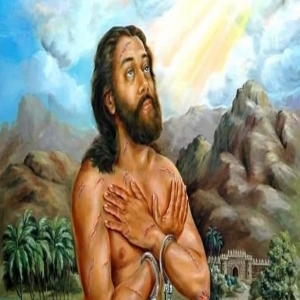

Last Tuesday morning, Father Jesu announced something special during mass at Saint Francis Xavier's Church in Chennai. "We have a new patron saint," he said, his voice carrying across the small congregation of shopkeepers, teachers, and daily wage workers. "Pope Leo has declared Saint Devasahayam the patron saint of all lay people in India." An elderly woman in the front row wiped her eyes. She remembered her grandmother's stories about this saint—a man who lived and suffered just like ordinary people do.
Saint Lazarus Devasahayam wasn't born into religious life. In 1712, he was born as Neelakanda Pillai in a village in Tamil Nadu, much like the villages that dot India's landscape today. He grew up to become a trusted court official under the king of Travancore, where he managed trade and settled disputes. Life was comfortable and predictable until 1741, when he met a Portuguese sea captain named Bento Pereira.
During their conversations under the shade of mango trees, Bento shared stories of Jesus Christ—a God who saw no difference between the rich and the poor, the high caste and the low caste. Something stirred in Neelakanda's heart. By 1745, he chose to be baptised, taking the name Lazarus, which means "God has helped." Later, he adopted the Tamil name Devasahayam, carrying the same beautiful meaning.
This decision changed everything. In 18th-century India, crossing caste lines was a perilous act. Friends turned away from him. The king he once served now saw him as a threat. But Devasahayam did not retreat. Instead, he lived his new faith quietly among the poor and forgotten. He visited sick people in their humble homes, shared his food with widows, and preached a simple message: every person is equal in God's eyes.
His enemies grew bold. They dragged him from his home in chains and paraded him through villages where crowds mocked him. For three long years, they tortured him with whips and locked him in dark cells. Through it all, Devasahayam held onto his faith. He forgave those who hurt him and continued to comfort fellow prisoners. On January 14, 1752, at just 40 years old, soldiers took him to a hill and shot him dead.
But death was not the end of his story. Common people—fishermen, farmers, labourers—began visiting the place where he died. They left flowers and whispered prayers, calling him their protector long before the Church officially recognised him as a saint.
Nearly three centuries later, in 2022, Pope Francis declared Devasahayam a saint. The celebration filled Saint Peter's Square with Tamil and Malayalam songs. Now, in 2025, Pope Leo has taken another historic step by naming him patron saint of India's lay faithful—the millions of ordinary Christians who live their faith not from church pulpits but from their homes, workplaces, and neighbourhoods.
The timing feels especially meaningful. Today's India, with its beautiful mix of religions, sometimes witnesses tension between different faith communities. In recent years, stories have emerged that break hearts—families forced to leave their villages in Chhattisgarh for choosing to worship in churches, pastors beaten for reading the Bible, young couples hiding their faith to avoid trouble. Reports show over 700 incidents of attacks on Christians last year alone, from burnt churches to forced conversions.
For Christians facing such challenges, Devasahayam's story offers hope and strength. He, too, faced hatred for choosing Christ—not as a priest with special authority, but as a married layman living an ordinary life. His example reminds us that holiness is not reserved only for clergy. It belongs to anyone who prays while washing dishes, stands up for bullied children, or shares meals with neighbours despite social pressure.
Cardinal Filipe Neri Ferrão, speaking on behalf of India's Catholic bishops, expressed this beautifully: "May our devotion to Saint Lazarus Devasahayam lead us to greater love of God and service in society." Across the country, parishes are already planning special prayers and celebrations, inviting people to light candles and share their own stories of faithful living.
What does having Devasahayam as a patron saint mean for ordinary Christians? It is not a magical protection from hardship—that would be too simple. Instead, it is an invitation to find the same hope he discovered. He teaches us to see dignity in every person, to forgive even when it hurts, and to build bridges instead of walls.
Picture a farmer in rural India, facing threats for hosting a small prayer group, remembering Devasahayam's trust that "God is my help." Or a mother teaching her children to love boldly, drawing inspiration from a saint who loved through suffering.
When Father Jesu finished his announcement that Tuesday morning, something had shifted in that small church. The congregation did not just learn about a new patron saint—they discovered a brother who understood their struggles, a fellow believer who had walked the same difficult path they walk today. In Devasahayam, India's lay Christians have found not just an intercessor but a companion for the journey of faith.